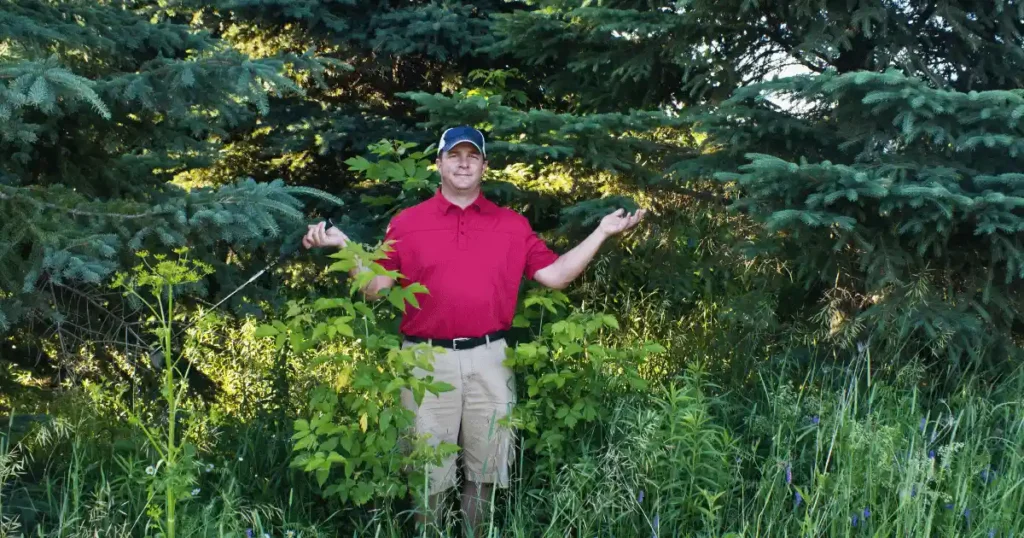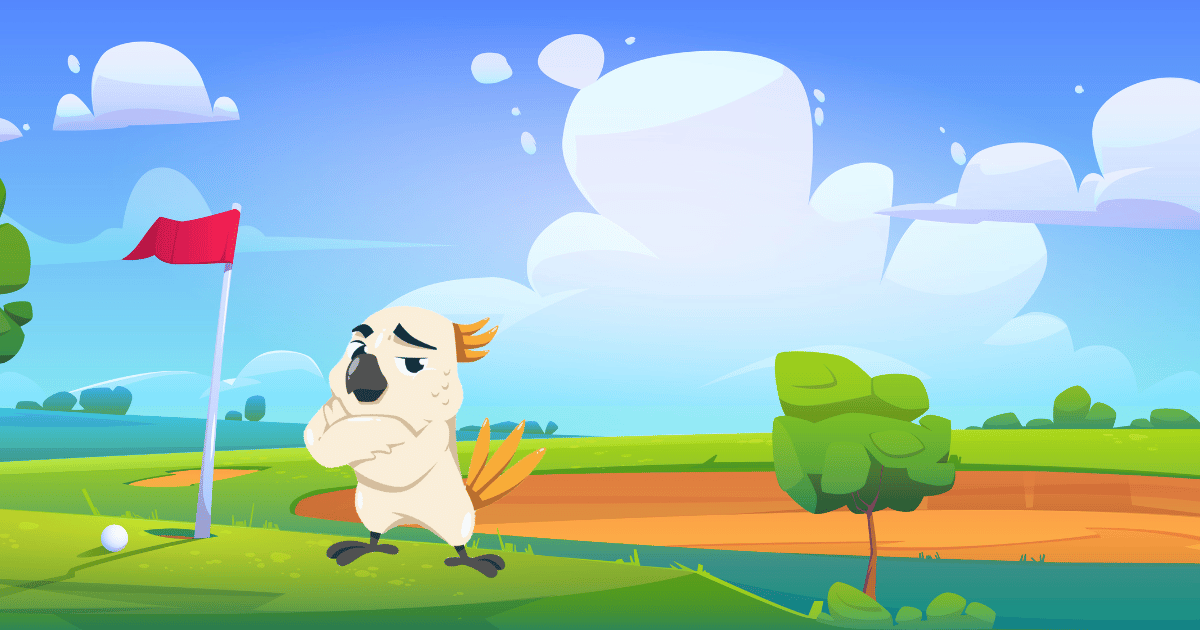A birdie in golf is a score that is one stroke better than par on a single hole.
For example, if a hole has a par of 4, and you complete that hole in 3 strokes, you have made a birdie.
Par is the standard number of strokes that a golfer is expected to complete a hole or a round of golf in. So, if a hole has a par of 4, it means that an expert golfer is expected to complete that hole in 4 strokes.
When a golfer scores a birdie, it’s considered a good accomplishment, as they have completed the hole in fewer strokes than the standard.
How a Birdie is Scored?

Examples of birdie scores
- Hole par: 3, Strokes taken: 2 = Birdie
- Hole par: 5, Strokes taken: 4 = Birdie
- Hole par: 4, Strokes taken: 3 = Birdie
- Hole par: 6, Strokes taken: 5 = Birdie
Why are birdies important in golf?
Lowering the score
A birdie can significantly lower your overall score, making a round of golf more successful.
Improving confidence
Making birdies can boost your confidence and morale, helping you to perform better on the course.
Pursuing personal bests
Birdies can help you set and achieve personal goals and records, giving you motivation to continue to improve.
Competitive advantage
In competitive play, birdies can provide an advantage over other golfers, potentially leading to a better finish or placement.
Aesthetic appeal
Birdies add excitement to the game, as golfers strive to complete a hole in as few strokes as possible. They also add an element of challenge and satisfaction to the sport.
Strategies for Making Birdies
Proper club selection
Making birdies in golf requires a combination of skills and strategy. One important aspect of making birdies is proper club selection.
When selecting a club for a shot, it’s important to consider factors such as the distance to the hole, the terrain, and the wind conditions. Using the right club for the situation can greatly increase the chances of making a birdie.
For example, if a hole is shorter and requires a shorter shot, a wedge or a shorter iron club might be a good choice. If the hole is longer, a fairway wood or a driver might be a better choice. It’s also important to consider the terrain and wind conditions, as these can impact the trajectory and distance of the shot.
By properly selecting the right club for the situation, you can increase your chances of making a birdie by hitting accurate shots that can set you up for an easy putt or give you a chance to make a birdie putt.
Proper shot selection
Along with proper club selection, another important strategy for making birdies is proper shot selection. This means choosing the right type of shot for a given situation, such as a chip shot, pitch shot, or full swing shot.
When making a shot, it’s important to consider factors such as the distance to the hole, the terrain, and any potential obstacles. By choosing the right type of shot, you can set yourself up for a birdie by getting closer to the hole and creating an easier putt.
For example, if you have a clear path to the hole but are facing a steep slope, a chip shot might be a good choice to get the ball close to the hole. If you are close to the hole but facing a sand bunker, a pitch shot might be a good choice to get the ball out of the bunker and onto the green.
Proper shot selection can greatly impact your chances of making a birdie, so it’s important to choose wisely and consider all factors before making a shot.
Mental preparation
In addition to proper club selection and shot selection, mental preparation is also an important aspect of making birdies in golf. As a golfer your mental approach and mindset can greatly impact your performance on the course.
To prepare mentally for making birdies, you can focus on positive visualization, goal setting, and maintaining a confident and focused attitude. This can help you stay calm and focused during a round of golf and increase your chances of making birdies.
For example, you can visualize making a birdie on a particular hole before you play it, setting a positive intention for your shot. You can also set specific goals for your round, such as making a certain number of birdies or focusing on hitting accurate shots.
Maintaining a positive attitude and focusing on the present moment can also help you stay focused and avoid getting discouraged by mistakes or challenges on the course.
Course management
Another important strategy for you to make birdies is through effective course management. This involves making smart decisions on the course and managing your game plan effectively.
When playing a round of golf, it’s important for you to have a plan for each hole and to adjust your strategy based on the progress of the round. This can help avoid costly mistakes and increase the chances of making birdies.
For instance, if a hole has a challenging green or a difficult bunker, it may be wise for you to play it safe and aim for the middle of the green, even if it means sacrificing a birdie opportunity. On the other hand, if the hole is easier or you are feeling confident, you may decide to take a risk and aim for a birdie.
Effective course management also involves managing your time on the course, such as taking time to make a shot and avoiding distractions. This can help you stay focused and increase your chances of making birdies.
By making smart decisions on the course and managing your game plan effectively, you can increase your chances of making birdies and performing well on the course.
Related
- What is an Eagle in Golf?
- What is a Good Golf Score?
- Why Do Golfers Yell Fore?
- What is a Golf Handicap?
The Impact of Birdies on a Round of Golf
Lowering your overall score
If you’re playing a par-72 course and make birdies on 5 of the 18 holes, that’s 5 strokes under par. These birdies can significantly lower your overall score for the round, potentially putting you in contention for a win or personal best.
Making birdies can also give you a boost of confidence, helping you perform better on the course. The satisfaction of making a birdie and lowering your score can be a great motivator to continue working on your game and striving for personal bests.
Improving your confidence
Making birdies can also have a big impact on your confidence level when playing golf. When you successfully complete a hole in one stroke under par, it can give you a sense of accomplishment and boost your morale.
Confidence is an important aspect of golf, as it can affect your performance on the course. When you feel confident, you’re more likely to make smart decisions and take risks that can lead to birdies and lower scores. On the other hand, if you lack confidence, you may play more cautiously and miss out on birdie opportunities.
Additionally, making birdies can help you build momentum throughout a round of golf. The more birdies you make, the more confident you’ll feel, and the better you’ll perform on the course.
Aiding in the pursuit of a personal best
Birdies can also play an important role in helping you achieve your personal bests in golf. Setting goals and records for yourself can provide motivation and help you continue to improve your game.
Keeping track of your birdies can help you monitor your progress and see how you’re improving over time.
In addition, birdies can help you set new personal bests. For example, you might aim to make a certain number of birdies in a round or a season, or you might try to beat your best score on a particular hole. Achieving these goals can give you a sense of satisfaction and help you stay motivated to continue to improve your game.
Conclusion
In conclusion, birdies are an important aspect of golf that can greatly impact a golfer’s performance and experience on the course. A birdie is a score of one stroke under par on a hole, and making birdies can lower a golfer’s overall score, improve confidence, aid in the pursuit of personal bests, and provide a competitive advantage.
Effective strategies for making birdies include proper club selection, shot selection, mental preparation, and course management. By making smart decisions on the course and managing your game plan, you can increase your chances of making birdies and perform well on the course.
In summary, birdies are a key aspect of golf that can greatly enhance a golfer’s experience and performance. Whether you’re playing for fun or in competition, making birdies can add excitement and challenge to the game and help you achieve your personal bests.
Frequently Asked Questions
What is the origin of the term “birdie” in golf?
Ans: The term “birdie” originated in the late 19th century and is said to have come from the sound of a bird chirping.
What is the difference between a birdie and an eagle in golf?
Ans: An eagle is two strokes under par, while a birdie is one stroke under par.
Is a birdie a good score in golf?
Ans: A birdie is considered a good score and is often seen as a sign of a skilled golfer.
Can a player have multiple birdies in a round of golf?
Ans: Yes, a player can have multiple birdies in a round of golf on different holes.
How does a birdie affect a golfer’s scorecard?
Ans: A birdie will lower a golfer’s score on the hole where it is made and will contribute to the overall total score for the round.
What is the average number of birdies per round for a professional golfer?
Ans: The average number of birdies per round for a professional golfer can vary, but typically ranges from 3 to 6 birdies per round.
Does making a birdie guarantee a win in golf?
Ans: No, making a birdie does not guarantee a win in golf. It is just one factor among many that contribute to the overall score for a round of golf.
Also See
Hi! I am Hannah, a golf enthusiast, have been perfecting my swing for over a decade, making long putts a breeze. Aside from playing, I am a professional golf writer, I try capture the nuances of the game and inspire others to embrace their love for golf. Follow me on Twitter.







